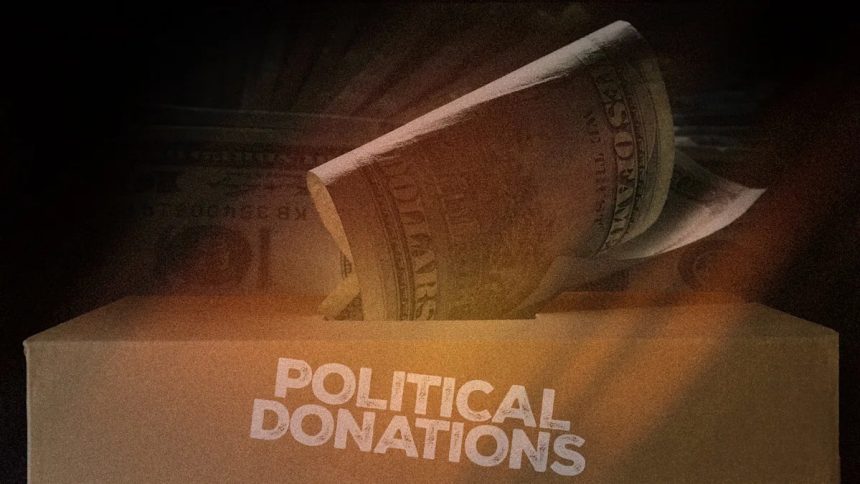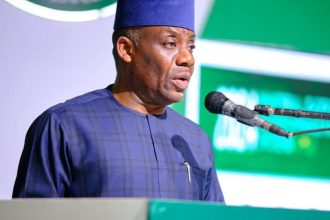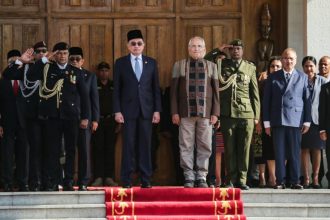Arizonans know more about political donors’ influence over elections since the state’s anti-dark money law took effect, but political campaigns still spent millions of anonymous dollars in 2024.
The voter-approved law intended to force groups to reveal the “true sources” behind campaign spending, but a review of public records showed that often didn’t happen. Arizona were resolute in their intention to require groups to tell the public who was funding them — 72% of voters approved the law, which was on the ballot as Prop. 211 in 2022.
But in the first election where the disclosure law was in place, 40% of campaigns listed no donors at all, according to a review by The Arizona Republic. More often, the reports showed groups funneling tens or hundreds of thousands of dollars to other groups, without reporting where the money originated.
Two groups, Opportunity Arizona and Stand for Children, reported six- and seven-figure donations from in-state and out-of-state groups, but did not identify the individuals behind the money, for example. Opportunity Arizona helped Democrats running for statewide office. Stand for Children helped a bipartisan slate of candidates. The right-wing Make Liberty Win Again group was accused of failing to report any donations at all, which the group denied.
All the groups were the subject of complaints, but they were cleared by the Arizona Citizens Clean Elections Commission, the state body tasked with enforcing the law.
The omissions laid out in complaints and found in The Republic’s review weren’t necessarily illegal, but they raise questions about whether groups are complying with the law and whether it’s living up to backers’ goal to “eliminate dark money.”
The uncertainty comes as conservative and libertarian groups challenge the constitutionality of the law in state and federal court, claiming it violates donors’ rights to free speech and association. Members of one conservative group told the courts they limited fundraising and advocacy to intentionally avoid triggering the disclosure requirement.
Terry Goddard, a Democrat and former state attorney general who spearheaded the campaign for the law, suggested it was normal that many reports didn’t disclose original donors since many organizations “are broad based and will have small contributors.”
But he was open to the idea that changes could improve compliance.
“Maybe somebody will have to go back and look at all the ways that they’re actually trying to get around it and figure out a way to have to close that loophole, because there’s no question in my mind that that’s what the people would like,” Goddard said.
Political groups spending in Arizona claim to have no big donors
Multiple disclosure reports during the 2024 election cycle showed big spending but no original donors, prompting complaints to the Clean Elections Commission.
Stand for Children, an Oregon-based nonprofit corporation, funneled $1.5 million to its Arizona branch to support Republicans and Democrats running for the state Legislature and school boards, but the group disclosed zero original donors.
After a complaint was filed with the Commission, attorneys for Stand for Children said the group didn’t need to disclose donors because they contributed the money in 2018, before the law took effect, and couldn’t be found.
The Commission cleared the group, noting in part that under the law, corporations can count as original donors. The Commission warned, however, that “different issues may arise” in the future if a corporation collected contributions after the law was enacted.
The group’s executive director, Rebecca Gau, called the complaint “completely baseless” and said Stand for Children “will continue to follow all relevant campaign finance laws.”
Rebecca Gau, Stand for Children Arizona Executive Director, has an extensive background in education policy, research and data analysis, which began in 1993 as an intern on Capitol Hill. Prior to her role at Stand for Children, Ms. Gau served as the Director of Governor Jan Brewer’s Office of Education Innovation.
Opportunity Arizona, a Phoenix nonprofit that funded Democrats running for the Legislature, reported hundreds of thousands of dollars from Future Freedoms, an Arizona political group; AFSCME People, a Washington, D.C.-based group for government union workers; and the League of Conservation Voters, a DC-based nonprofit.
The complaint against the group was dismissed after its officials claimed the money came in less than $5,000 at a time.
“We worked hard to comply with this new law that is inarticulately written, including seeking guidance through an advisory opinion from the Citizens Clean Elections Commission,” Ben Scheel, executive director of Opportunity Arizona, said. “Unfortunately, because of the way this law is written and currently being interpreted, we’ll likely continue to see complaints filed against organizations complying with the law because there is often no way to identify if groups are complying based on publicly available information.”
The complaint against Make Liberty Win Again, which received hundreds of thousands from its national counterpart and did not file a disclosure, was dismissed for the same reason: the group claimed to have no original, individual donors who gave more than $5,000.
Make Liberty Win Again did not respond to questions emailed by The Republic.
Legal challenges could end disclosures in Arizona campaigns altogether
If the legal challenges to the Voters Right to Know Act are successful, the courts could strike it down as unconstitutional and nonprofits or independent expenditure committees would no longer have to disclose the sources of their campaign spending.
In the context of 2024, that would mean the loss of 168 Voters Right to Know Act reports disclosed to the Secretary of State’s Office and available the public online.
Oral arguments at the Arizona Supreme Court are scheduled for Sept. 11, while the federal case was heard May 15 by the 9th U.S. Circuit Court of Appeals. The federal case could be appealed to the U.S. Supreme Court if challengers are unsuccessful.
Despite questions about compliance, the law did provide Arizonans some new information about the influences behind elections.
The Republic’s review showed wealthy figures funnelled millions through out-of-state groups to influence Arizona elections.
A ballot measure to do away with party-specific primaries, which was unsuccessful, drew big-names who gave money through the Delaware-based UNITE America PAC Inc. They include:
-
Michael Bloomberg, former New York mayor and businessman: He gave more than $1 million;
-
Kathryn Murdoch, daughter-in-law to conservative media mogul Rupert Murdoch: She gave $1.7 million;
-
California-based video game developer Marc Merrill and Texas-based philanthropist John Arnold: They gave nearly $1 million each.
Goddard said the fact that spending continued despite the new rules showed concerns that disclosures would scare away donors were overblown.

Former Phoenix Mayor Terry Goddard speaks about how Gustavo Martinez has turned his life around at inside his law offices in downtown Phoenix on July 15, 2025. Martinez used to sleep on Goddard’s office porch before Goddard said the Justa Center helped give him a home and a place to take care of and call his own.
What changes could shine more light on ‘dark money’?
Tom Collins, executive director of Arizona Citizens Clean Election Commission, said there was no doubt Arizonans were learning more about political spending under the anti-dark money law than before it was in place. In the past, government officials were barred from even asking certain non-profits about their donors, he said.
Still, he said he hopes to see improvements to the system, such as providing reports in a digital format to allow for data extraction.
The Secretary of State’s Office, which is in charge of collecting and publishing disclosure reports, did not require groups to submit the same, standard disclosure form.
The Republic’s review showed the end result was a mishmash of PDF files that looked different, making data extraction difficult. Some showed the spending group’s tax status, and others did not. Some disclosed middle-mans’ sources, and others did not. While most reports separated direct donors from intermediaries, others combined all the information into one “transactions” list.
Also, many groups left portions of the forms blank — making it unclear whether the group was refusing to provide information or legally wasn’t required to.
Clarity came only in the handful of cases where complaints were submitted and the Commission investigated.
Collins said he was interested in groups clarifying their omissions in future disclosures — and some groups did so already. The Arizona Association of Realtors added a note that said, “No source greater than $5,000” on one of its reports. On another, it clarified donors contributed prior to the law and thus didn’t need to be revealed.
The Arizona Secretary of State’s Office did not respond to questions by The Republic about its collection process and whether the agency has plans to improve the system going forward.
Collins told The Republic the Commission does not audit the reports but could consider doing so. Thus far, the group has taken more of a carrot, not stick, approach to encourage compliance, he said.
“There will be, if we choose to go down that road, an extremely loud — and I would go so far as to say angry — reaction from the regulated community, the spenders,” Collins said.
Taylor Seely is a First Amendment Reporting Fellow at The Arizona Republic / azcentral.com. Do you have a story about the government infringing on your First Amendment rights? Reach her at tseely@arizonarepublic.com or by phone at 480-476-6116.
Seely’s role is funded through a collaboration between the Freedom Forum and Journalism Funding Partners. Funders do not provide editorial input.
This article originally appeared on Arizona Republic: Arizona’s anti-‘dark money’ law didn’t stop hidden campaign donations









